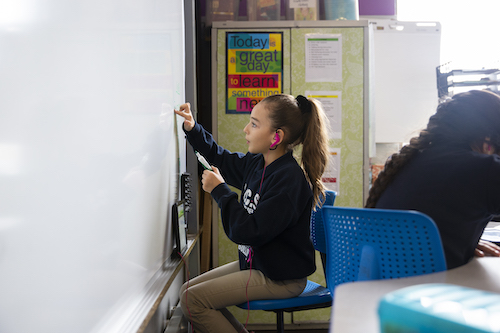

High dosage tutoring for academically at-risk students
This brief provides a review of the research on high dosage tutoring as an intervention strategy for supporting at-risk students. It highlights the benefits and the non-negotiable factors for effective implementation and usage.
By: Miles Davison, Sofia Postell, Jazmin Isaacs, Ayesha K. Hashim
Topics: COVID-19 & schools, Equity, Growth, Informing instruction


Typical learning for whom? Guidelines for selecting benchmarks to calculate months of learning
To describe the impact of the COVID-19 pandemic on students, researchers have translated test scores into months of learning to claim how many months/years students are behind in school. Despite its perceived accessibility, there are major downsides to this translation. To inform future uses by researchers and media, we discuss in this brief how to calculate this metric as well as its trade-offs.
By: Megan Kuhfeld, Melissa Diliberti, Andrew McEachin, Jon Schweig, Louis T. Mariano
Topics: COVID-19 & schools, Equity, Growth, Growth modeling, Seasonal learning patterns & summer loss


MAP-Growth can lower the cost and increase the accuracy of gifted and talented placements
MAP Growth can help identify students during both phases of placement decision-making, including for gifted and talented programs.
By: Scott J. Peters
Topics: Assessment


3 academic interventions policymakers can support to help get students back on track
Policymakers can support specific academic interventions to help students complete their academic recovery following COVID school closures.
By: Emily Morton
Topics: COVID-19 & schools


Exploring the educational impacts of COVID-19
This visualization was developed to provide state-level insights into how students performed on MAP Growth in the 2020–2021 school year. Assessments are one indicator, among many, of the student impact from COVID-19. Our goal with this tool is to create visible data that informs academic recovery efforts that will be necessary in the 2022 school year and beyond.
By: Greg King
Topics: COVID-19 & schools, Innovations in reporting & assessment


Education’s long COVID: 2022–23 achievement data reveal stalled progress toward pandemic recovery
New research shows progress toward academic recovery stalled in 2022-23. This research brief covers data from 6.7 million US students examining academic gains relative to pre-pandemic years as well as tracking the gap in achievement between COVID year student groups compared to their pre-pandemic peers.
By: Karyn Lewis, Megan Kuhfeld
Products: MAP Growth
Topics: COVID-19 & schools, Equity


Technical appendix: 2022-23 achievement data reveal stalled progress toward pandemic recovery
The purpose of this technical appendix is to share more detailed results and describe the sample and methods used in the research in Education’s long COVID: 2022-23 achievement data reveal stalled progress toward pandemic recovery report.
By: Karyn Lewis, Megan Kuhfeld, Jazmin Isaacs
Topics: COVID-19 & schools, Equity


